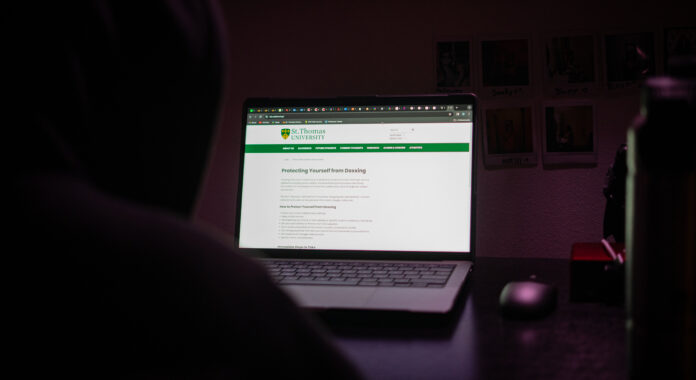

St. Thomas University has created a new resource to help educate students on the risks of doxxing online. Students received an email Feb. 6 promoting a page on STU’s website with information on how to prevent and report doxxing.
The website defines doxxing as “the act of collecting an individual’s private information (through various platforms including social media) and broadcasting the private or identifying information for the purpose of harassment, particularly racial and gender-based harassment.” While doxxing in Canada is not illegal if no illegal means such as hacking are used, the practice can still put at risk the safety of a person.
STU’s director of communications Ashlen Albright said the university wants to ensure it is informing people on the steps that students can take to protect themselves from being a target online.
She added there was no particular incident that initiated the creation of the resource. The resource is a response to the learning landscape that has been reliant on online communication since the beginning of the pandemic.
“Especially coming out of COVID and everything being online, there were obviously a lot of topics and themes discussed around working online, studying online and sharing lectures online,” said Albright.
Besides defining the term, the anti-doxxing resource has instructions on how to protect yourself including changing passwords, adjusting online privacy settings, two-factor authentication and avoiding posting personal information. It also has information on what to do if a student suspects they are a victim of doxxing, such as recording any harassment or impersonation as well as blocking and reporting suspected doxxers.
Albright mentioned that doxxing and online fraud have become more prevalent recently.
According to a Pew Research Center study in 2021, 21 per cent of women and 13 per cent of men personally experienced some form of doxxing. The study also showed that 31 per cent of people aged 18 to 29 were targeted by doxxers.
Doxxing and online safety information is especially relevant to younger people, said Albright.
“Younger generations especially are more and more living their lives online, working online, studying online. Not to say that you’re not engaged in classes in real life as well, but I think it’s just becoming more and more part of everyone’s life,” she said.
Albright said the university’s IT department is “constantly working” on improving security and anyone with suspicious activity on their STU accounts specifically should not hesitate to report it.
“It’s top priority to make sure that students, faculty and staff feel safe online … We’re providing online services at St. Thomas that you have to engage with, so we want everybody to feel safe on those platforms.”
